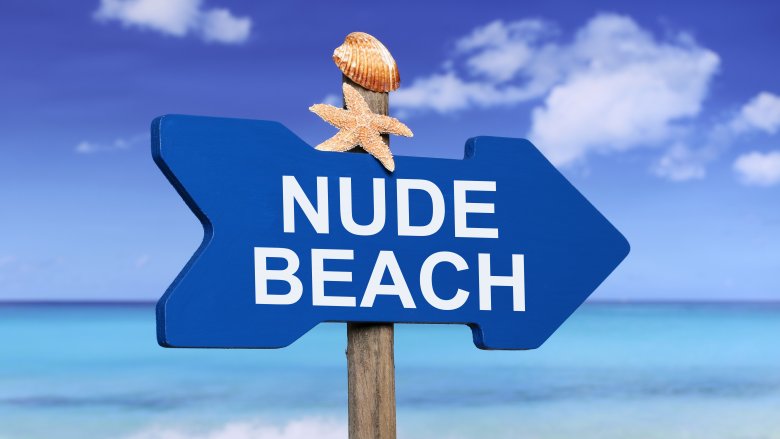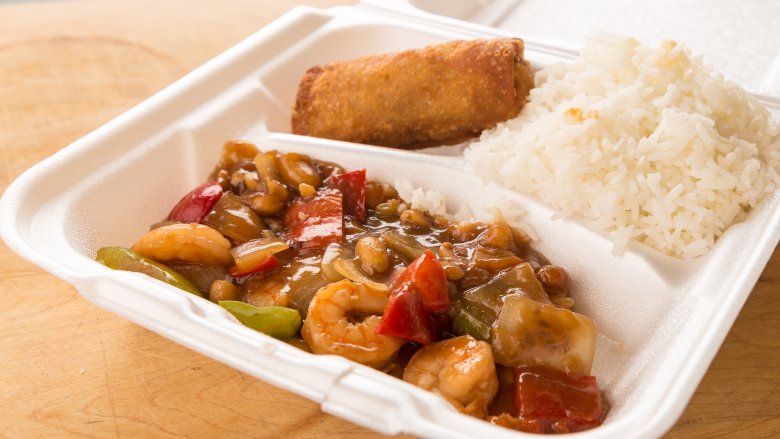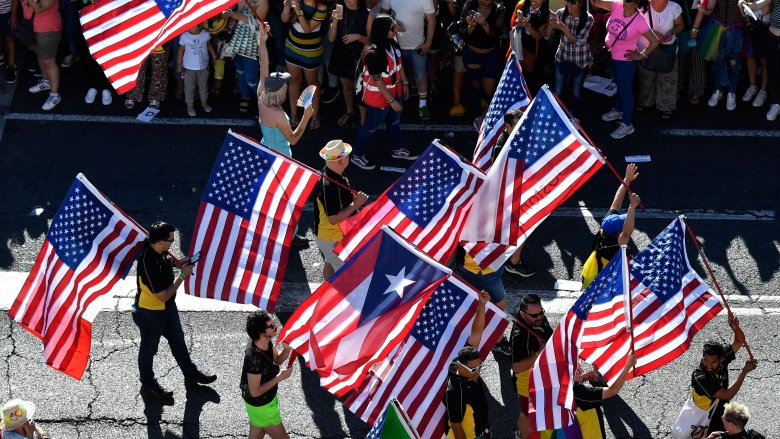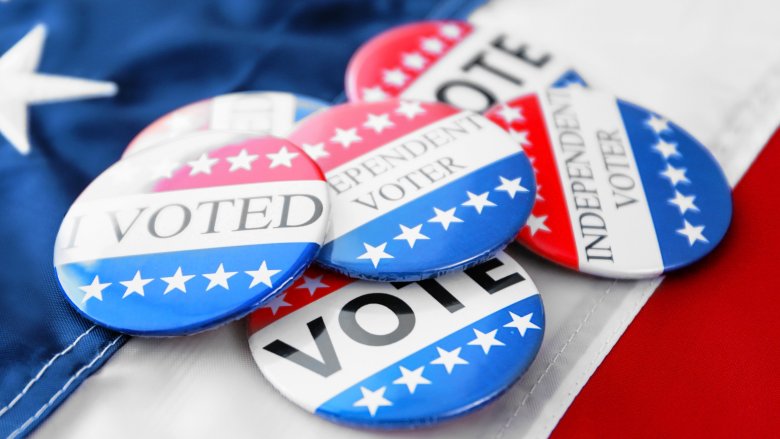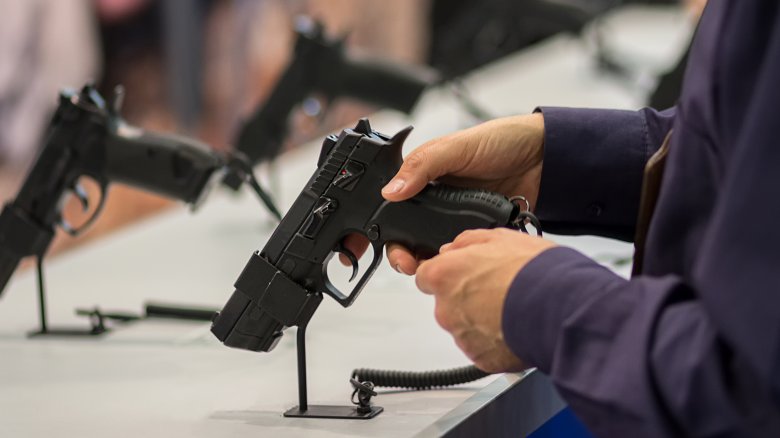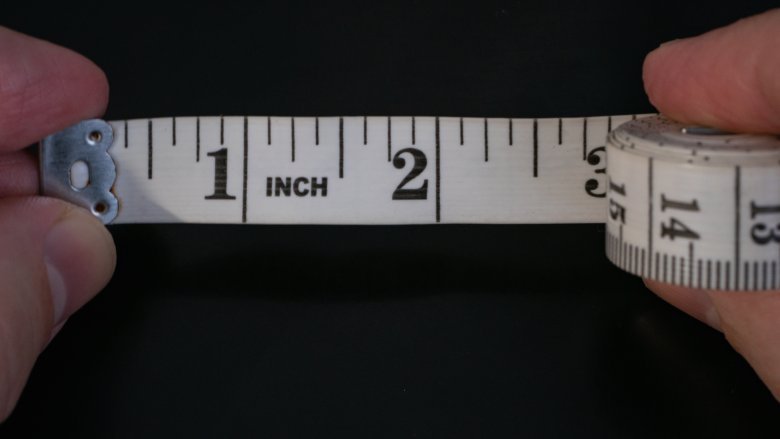Things Americans Do That Totally Confuse People In Other Countries
Since the United States is arguably the world powerhouse, it's easy to think everyone else must have us figured out by now. We export our music, our movies, and our military, so surely foreigners must know us inside and out. But it turns out there are still aspects of the USA that confuse the heck out of the rest of the world.
We put ice in all our drinks
When was the last time you had a drink without ice in it? If you're an American, it's probably been a while. We love ice. We take our liquor on the rocks, we ice our coffee and our tea, and we fill our fountain drinks to bursting before adding a dash of soda. If a waiter brought us water with no ice in it we'd wonder what kind of apocalypse was happening in the kitchen.
Not so in the rest of the world, especially Europe. If you've been abroad you probably noticed that getting ice in a drink is the exception, not the rule. According to Smithsonian magazine, this might be because Europeans see ice as taking up precious room that could be filled with the liquid you're actually paying for. (Free refills are rare in Europe, and per the BBC, France has even banned them in the battle to stop people getting fat.)
But history-of-drinking writer Henry Jeffreys suggests a more historical explanation. Before refrigeration, ice was a luxury item in Europe. Since it was so hard to keep ice frozen, only the rich had access to it. But it was much easier to get ice in America, where it was literally harvested from lakes and kept cool in special boxes. Over time, Americans got used to having ice in their drinks, while Europeans continued to drink their tepid liquids, a trend that still exists today.
We're complete prudes
America was founded by Puritans, and we've managed to keep a firm grip our puritanical label with white-knuckled fists until today. Violence we're relatively okay with, but when it comes to sex and nudity, we could not be bigger prudes.
This is obvious in pop culture. When movies show most nudity and any sort of sex, they're usually given an R rating. Meanwhile, violence has to be incredibly intense to get the same. In a YouGov poll, parents rated "graphic violence" as just as deserving of an R as female nudity, male nudity as slightly worse, and sexually oriented nudity as much less acceptable to the poor virgin eyes of anyone under 17.
In Europe, the opposite is true. According to the Hollywood Reporter, the erotic lesbian drama Blue is the Warmest Color, which received an NC-17 rating in the U.S. for its graphic sex scenes, was rated suitable for anyone over 12 in France. Countries like Germany are especially okay with nudity, to the point the government included instructions to its citizens visiting the USA that being nude in public, even just topless (for women), even on a beach, could be enough to get you arrested. Rick Steves' travel blog warns Americans that sightseeing in Europe can mean seeing lots of naked flesh. This includes on billboards, in government-issued pamphlets, newspapers, and on saucy postcards you can send home to your pearl-clutching friends.
We love our small talk
If you venture outside in America today, chances are you'll have numerous conversations, even if you're just getting groceries. That's because we're expected to chat with anyone we come into contact with. "How's your day going?" "Did you find everything all right?" "I love your top." Americans are the world champions of small talk.
This can be anything from jarring to insulting for people from other countries. According to The Bonjour Effect: The Secret Codes of French Conversation Revealed as reported by Quartz, the French might shut down a conversation with you if you ask what they do for a living. They don't like being fit into a box like that, defined by what they do. In the New Yorker, Karan Mahajan, who's originally from India, says it took her over a decade to master the art of American small talk. In her home country, she says, interacting with shopkeepers is about your transaction and nothing else. You aren't supposed to act like you're friends with them.
According to the Harvard Business Review, getting the hang of small talk is especially important for foreigners in corporate settings, where being able to chat casually with your superiors can be good for your work prospects. And you thought you got that promotion because you were good at your job.
We take our extra food home with us
We've all been there. You're eating out and it's the end of the meal. Your eyes were a lot bigger than you stomach, and you have a bunch of food left over. No problem, just ask the waiter for a doggy bag and take the rest home. Everyone knows it's not actually for the dog, though, and that you'll be eating it cold tomorrow night in your underwear while watching Friends on Netflix.
What's completely acceptable in the U.S. is downright mortifying in other countries. According to the BBC, a survey by the Sustainable Restaurant Association found that 25 percent of people surveyed in the U.K. were too embarrassed to ask for a doggy bag, and 24 percent of people actually thought they weren't allowed to because of health and safety regulations. According to The Local, the same is true in France, with some restaurant owners thinking they could be sued if people left with food that ended up making them sick once they were at home. Another difference is that the French are taught to always finish everything on their plate to be polite, even if they're full. That might be possible in a country that gives you realistic portion sizes, but in America we like our plates piled high, and no one wants to see restaurant patrons fill themselves to bursting. The inevitable result could really ruin the ambiance.
We expect you to tip
Tipping is ingrained in Americans from a very young age. We know that it's the polite and correct thing to do, and it's so expected that most waitstaff are paid less than the minimum wage on the assumption they will get lots of tips to make up for it. Not tipping when it's expected is almost unheard of and makes a very clear point: either you're a terribly cheap person or the waiter literally stuck his face in your soup.
To foreigners, tipping can be an absolute minefield. Just think about how complicated the process is when you break it all down. Some service staff you tip, others you don't. Some get 15-20 percent, some just need a couple bucks. BBC America had to tell its readers that tipping wasn't actually legally required, even though it also said that if you don't tip you might get chased down the street by a waiter wanting to know what's up. It also explained the secret code all Americans know of tipping 10 percent or less to say the service was terrible. The Australian site Traveller gives its readers a helpful and very detailed breakdown of who to tip and how much. When in doubt, if you come from a non-tipping culture and are visiting America, just throw money at anyone who (politely) talks to you.
We can't get enough of our flag
It's hard to escape the American flag. We fly it in front of buildings and from our houses. We put it on T-shirts and bikinis, on cakes and cookies. In school, each day starts with pledging allegiance to the flag hanging in the corner of the room. We sing our anthem about it before every sportsball game. There's probably one sneaking up behind you right now.
Not so in many other countries. According to the National Review, in Europe, if you go waving a flag around people are likely to think you fall on the extreme right-wing of the political spectrum. In England, the people who display the St. George's cross tend to be football hooligans at best and racists at worst. This means your normal, everyday Englishperson doesn't want to have the flag around lest people get the wrong idea about them. According to Der Spiegel, over 60 years after World War II ended, the Germans still have a "pathological" fear of being patriotic, especially when it comes to flying their flag. The Nazis went a bit overboard with the whole swastika thing, so it makes sense, even though we're now talking about a completely different flag. The LA Times says that some countries, like India, discourage reproduction of their flag for non-official reasons. It's almost like putting it on everything in the world makes it less sacred.
We don't include tax in our prices
Americans are used to the idea that the price you see on a tag is not going to be what you end up paying. We just prepare to hand over a little more money than we see on the sales floor, and most people don't bother calculating things out later to make sure the tax was correct.
It's crazy when you think about it. We have state sales taxes but then cities and counties can add more to that, which means the amount you pay for something that has a tag price of $9.99 can vary from one store to another one close by. Then there are special rules for things that don't have added tax in some places, like alcohol or groceries or even clothes. Try explaining all that to a foreigner who is used to having their taxes included in the price and paying exactly what it says on the tag. TripAdvisor spends hundreds of words trying to make all this clear to its readers. Maybe it's just a good idea to hand over your wallet at the counter and hope the cashier is honest — it's not that different than what everyone else does.
We smile like crazy people
Americans smile all the time. Whether it's saying "cheese" for photos because genuine joy is too difficult, or being told to smile by some jerk walking down the street if we dare to have a contemplative moment, the American instinct is to bare our teeth and crinkle our eyes.
Unfortunately, this makes us look ridiculous to people from other countries. According to a psychologist at the Polish Academy of Sciences, people from Japan, India, Iran, South Korea, and Russia think those who smile look significantly less intelligent than those who don't. People in India, Argentina, and the Maldives think smiling makes you look dishonest. Smiling is so foreign to some countries that American companies actually have to teach their employees how to grin at customers, which is what happened when McDonald's opened in Russia in the '90s, according to NPR. Meanwhile, the New York Times reports that Walmarts in Germany had to let their staff stop smiling at customers after some men interpreted this basic kindness as flirting. Best to just walk around ashen-faced and serious all day.
We have the longest, most expensive elections ever
Did you know Donald Trump is already campaigning for the 2020 election? The rallies he attends are paid for by his reelection campaign, meaning the race for the White House began a month after he took office. Even for America that's pretty crazy, but we're used to our elections lasting years at a time and costing more than the GDP of some nations.
The cost and length of American elections are absolutely obscene when you look at other countries. In 2012, the cost of all federal U.S. elections (the presidency and Congress) was $5.8 billion. Meanwhile, the 2010 British elections cost a mere $49 million, which, according to the BBC, means we spent 120 times as much total and 23 times as much per person. In the U.S., candidates campaign for years, while the Washington Diplomat reports that the country with the next-longest campaigns is Germany, at a measly 114 days. According to the CBC, the longest campaign in Canadian history lasted less than 11 weeks and that was way back in 1926. No wonder Canadians are so polite: they have so many fewer family dinners to yell about politics.
We're obsessed with guns
Americans love guns so much it's almost a religion, coming right after actual religion in the Bill of Rights. Even the most liberal politicians can be put in political danger if they hint at stronger gun laws. Our devotion to these deadly weapons is baffling to people in many other countries.
According to CNN, 19 countries, including Ireland, Norway, and New Zealand, don't even normally arm their police. Additionally, Americans own 48 percent of all the civilian guns in the entire world. That's a mere 5 percent of the population owning almost half the guns. We also own more guns per person than any other country, with Yemen coming a distant second.
Business Insider reports that our gun culture is shocking to people in places like Australia, who enacted tight restrictions on gun ownership after a terrible mass shooting in 1996. After the shooting of nine people in a South Carolina church, the British newspaper The Independent ran with the headline "America's Shame." Love 'em or hate 'em, there are some Americans' hands you'll never pry guns from.
We have a complete lack of male affection
If you're a straight American male, you probably don't spend a lot of time affectionately touching your straight American male friends. Sure, there are exceptions, like when there's alcohol involved or when you pat them on the butt while playing sports. But in general, heterosexual male contact in America is avoided. And according to the Daily Beast, yeah, it's probably because of homophobia.
It didn't used to be like that in the U.S. Photos from the 1800s show plenty of male-on-male affection. Men used to share beds with their friends regularly. But things changed. When President George W. Bush was pictured holding hands with Saudi Crown Prince Abdullah, a bunch of average guys on the street were totally weirded out. The New York Times even ran an article in response to the incident, explaining that men holding hands in friendship in the Arab world was normal, with no romantic connotations. People from India wouldn't have been shocked either, since it's just as common for guys to hold hands there. A writer for South Africa's Mail & Guardian lamented that Africans were becoming more Westernized and saw dudes holding hands as "gay," while calling for the return to a time when it was typical to see, for example, Nelson Mandela intertwining his fingers with those of other African leaders.
And it goes even further. The Denver Post points out that in areas of Europe, the Middle East, Africa, and South America, men greeting each other with a kiss or four on the cheek is expected and polite.
We work ourselves to death
Ever since the Puritans landed here with their idea that God liked you more if you worked really hard, Americans have thrown themselves into their jobs. Unlike in most other Western countries, where people work so they can have enough money to enjoy their lives, many Americans work for the sake of working. And foreigners are appalled by it.
According to CNBC, the U.S. is the only "advanced economy" where workers aren't guaranteed any paid vacation days. A quarter of private sector workers get no paid time off. Compare that to somewhere like Sweden, where they get five paid weeks off a year. But even when Americans do get those precious vacation days, they don't take them. Best Life found that 52 percent of U.S. workers don't use all the PTO they earn, letting 705 million days of relaxation a year go to waste. It's why burnout is a bigger problem here than in other places.
Business Insider listed more things about the Puritan work ethic that shock people in foreign countries. Americans barely take breaks during the day, and only 20 percent of them even bother to eat lunch away from their desks. We work crazy long hours (about 47 hours per week compared to Germany's 35) and even when the work day is technically over, we still do work-related things like reply to emails. (In France, you are legally allowed to ignore them after hours.) No wonder Americans are 36th in the world when it comes to job satisfaction.
We still use the imperial system
The U.S. infamously doesn't use the metric system when it comes to measurement. We're very happy having completely illogical conversions like 16 ounces to a pound, 5,280 feet to a mile, and 8 pints to a gallon. Multiplying by 10 is too complicated for our brains. But what you might not realize is just how weird it is we still use this system. Imperial isn't just uncommon worldwide, it's basically unheard of.
According to ZME Science, besides America, only two other countries use imperial on a wide scale: Myanmar and Liberia. But Myanmar is in the process of switching to metric, so soon it will just be the U.S. and one African country with fewer than 5 million people still holding on to the old ways.
We could have adopted metric almost from the beginning. Measuring things accurately used to be extremely difficult, to the point it was considered so important that the power of Congress to "fix the Standard of Weights and Measures" was included in the Constitution. Metric was invented in 1670 but only caught on after the French Revolution in 1789, when France adopted it. Thomas Jefferson, who loved France, thought the U.S. should get in on it too. But France didn't invite an American representative to come learn about the new system, and the snub meant the U.S. gave up on the idea for almost two centuries. Then in 1975, Congress said America would switch to metric within 10 years. But the public resisted, and it never happened.
Everything about how we drive is strange
Almost everything about America's driving culture is weird to foreigners. Let's start with the most obvious: the cars themselves. People in the U.S. love giant automobiles. IHS Automotive found that "larger vehicles" made up 63 percent of all sales in 2013. Overseas, that number drops to a mere 25.4 percent. If you buy a pickup in America, there's an 88 percent chance you'll go with the full-size model. SUVs see 54.4 percent of customers ask for a large. Go big or go home, right? But in other countries, only 36.5 percent of people go with oversize SUVs and just 17.7 percent select larger pickups.
Once Americans get in their giant vehicles, they spend a whole lot of time in them compared to other countries. Probably thanks to the USA's lack of decent public transportation and huge size in general, Americans cover a lot more mileage than foreigners. The Car Crash Detective reports the average person in the U.S. drives 13,476 miles per year, or about 37 miles a day. Those in Norway and Sweden, on the other hand, only manage around 21 miles a day, and in Britain they cover less than 18. They must be in a hurry to get out of their tiny, claustrophobic cars.
Rick Steves' Europe says our driving laws can be confusing too, especially the fact Americans are allowed to turn right on red, unless it says otherwise. In the EU, it's the opposite: No right turn unless it specifically says you can.
We don't let young people drink
If you grew up in America, you probably railed against the injustice of the drinking age at some point in your teens. College is so inconvenient when you have to befriend someone older to buy your booze for three years. And when it comes to legal drinking ages, America is absurdly strict compared to most of the rest of the world.
According to Supercall, 21 is pretty much the oldest you have to be to drink anywhere. (This doesn't include about a dozen predominantly Muslim countries where drinking is banned altogether.) Of the places that do let you drink eventually, no country makes you wait longer than 21. And of the handful of countries that do set the bar that high, almost all of them are also Muslim-majority. More than 65 percent of countries let people drink at or before 18. In Antigua and Barbuda, a 10-year-old can legally have a beer next to you at a bar. Seventeen countries have no age limit at all.
You'd think our harsh restriction would mean we are exceptionally responsible with our imbibing in the U.S. But the opposite is true, according to Mic. America has the worst rate of binge drinking in the world, and 90 percent of all alcohol consumed by the underage is done so in a binge drinking session. When it's something illicit, when you haven't been brought up to sip a glass of wine at dinner, alcohol becomes something you need to drink in huge amounts, quickly.
We love Greek life
Fraternities have been around in the U.S. for more than 200 years, although sororities didn't show up until the late 1800s, when women were finally allowed to attend college. They are a distinctly American institution. Universities in other countries have clubs and societies, of course, but Greek life was invented in the U.S. This means foreigners who come here for college don't know what to expect.
Hollywood valiantly stepped in to spread the concept of frats and sororities to the rest of the world, but it's not the most accurate or flattering representation. Alina Braun came to Washington D.C. from Germany and says she thought the Greek system was just "rich students living in big houses wanting to be one of the 'popular' kids, partying and getting drunk every weekend and trying to date the quarterback or a cheerleader." Bustle adds that films like Van Wilder, The House Bunny, and Neighbors portray members as horrible human beings: "The girls are b*tchy and conniving and the dudes are drunk and rapey" and "everyone is playing some sort of drinking game that renders them so drunk they can't even remember their own first name."
U.S. News and World Report put together a guide on fraternities and sororities for foreign students to counter these stereotypes. Surprises include the fact there's nothing Greek about them and how much of a time commitment they are. Braun, the student from Germany, was intrigued by the amount of charity work they do and how members genuinely see each other as family.
We hold the door for strangers
There are plenty of places where holding the door open for a stranger behind you is considered polite, but it isn't something done in many Asian countries. So visitors who come to the U.S. from places like China and Japan may suddenly find themselves adjusting to this new way of being well-mannered.
The Japanese blogger Madame Riri (via Sora News 24) says that while people in her country are usually considered exceptionally polite, they don't have the "odd door-holding culture" of Westerners. She says when she holds the door for a stranger in Japan, she's "usually met with a grateful, but slightly bemused smile."
Real Clear explains the difference is down to an alternate take on politeness. According to them, in Asia, "it's assumed that most would prefer to walk at their own speed rather than walking fast to reach the door being opened for them." Any American who has found themselves speeding up to avoid an awkward door-holding situation can definitely understand that way of thinking.
One Chinese woman who spent four years in the US wrote in Freely Magazine that she got reverse culture shock when she finally returned home, where she suddenly saw the lack of door holding as rude. But when she tried to hold the door for a mother and child, a whole line of people followed, blocking her way and not saying thank you. She concluded because of the "large population and busy lifestyle, holding doors for the next person seems impossible in China."

